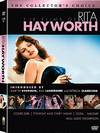





Teresa Wright
Biography | Filmography | Awards | Articles | Remembering | Bibliography | Gallery | News | Downloads | Links | Image Credits | THE LITTLE FOXES | MRS. MINIVER | SHADOW OF A DOUBT | THE PRIDE OF THE YANKEES | THE BEST YEARS OF OUR LIVES
| Interview: | Excerpt 6 |
Reminiscences of Teresa WrightNew York, June 1959On Alfred HitchcockWith someone like Hitchcock, his main emphasis is on the story itself. He's a great story-teller, and he makes you aware of the story and of the plot, and you become interested in it with him. If I want to think of one quality that I think about with Hitch, it's that he is the most musical director I know. Sound plays a great part in all his pictures. Sound plays a great part in the build-up of suspense -- the click of a door, the sound of footsteps, the cup going on the tray, the way the match hits the folder at the right moment. Each thing is used. He uses sound for effect more than anybody else I know of. As I say, I remember in "Shadow of a Doubt," which is still my favorite picture of all that I've ever done, I went in and sat down and listened to Hitch tell me the story. He not only told me the story of "Shadow of a Doubt," he told me the movie of it. He gave me a visual picture of it ahead of time, and I must say the finished picture that I saw was not much different from what I'd heard. I think he has the most visual and sound concept of what he wants of anyone I've ever worked with. Q: Offhand, that doesn't sound like the fullest use of his actors.Well, it's interesting -- I suppose in a way it's not. It's not as personal a thing. And yet, I don't know why, Hitch seems to "handle" women -- you know, a women's director -- but whatever it is, it's because I think he has a certain concept about women. He was one of the first directors, creative people that I can think of, who had the concept of the "sexy lady." Up to that time, you either were a lady or you were sexy, glamorous, whatever -- and the two never met. Hitch had this thing, he loved the contrast, the surprise element. Therefore he was much more effective in telling the story, from a woman's point of view, than any other director I can think of. He loved the thing of having this lovely, soft-spoken, elegant lady suddenly seem to show (or show) some great passion, or have her life somehow endangered by this passion under this apparently icy exterior. He also likes to have the ideal of the sweet, good exterior holding something evil inside. Surprise again. That's what he is -- suspense -- and he uses suspense in romance as well as in story-telling. © 1959 Columbia University and the Oral History Research Office |
|
Return to the Interview Excerpts
Table of Contents. |
| Now in Print! |
|---|
| Now on DVD! |
|---|
Buy Videos & DVDs |
|
Buy Movie Posters |
|
Buy Movie Posters |
|
Classic
Movie Merchandise |
|
![]() Printer-friendly version.
Printer-friendly version.
![]() Return
to the top.
Return
to the top.
Last updated:
March 10, 2011.
Reel Classics is a registered trademark of Reel Classics, L.L.C.
© 1997-2011 Reel Classics, L.L.C. All rights reserved. No
copyright is claimed on non-original or licensed material.
Terms of
Use.









